During the GENERAL HOSPITAL GENERAL DAYS OF THE GENERAL HOSPITAL, they provided 333 consultations, being mostly related to carelessness in the treatment of chronic - degenerative diseases.
Caleb Cienfuegos, director of the hospital, indicated that last weekend in which holy days were held, there were no major eventualities within the care in this hospital and that following the statistics of previous years, there was a very similar flow.
Óscar Alonso Pérez Rico, Chief of Medical Benefits of the IMSS, said that only 40% of diabetics maintain controlled disease, that is, 60% minimizes the condition and ignores that it can suffer from the consequences that will lead them to a state of disabilityor death.
“They do not have a metabolic control, their sugar, or their cholesterol or their renal function or their weight are in the range in which it has been shown that having them there keeps you out of complications;They are patients who do not accept the disease or are not willing to make changes to be free of complications. ”
In the long term, not controlled diabetes is subject to the patient to lose sight, renal capacity or a limb.
Today 2 thousand patients affiliated with IMSS are subject to dialysis treatment, 300 suffer retinopathy and another 300 are about to lose a leg, all accordingly of not attending diabetes.
In addition to health cost, Pérez Rico warned that diabetes is the condition that generates the most cost to the institute.
According to the head of medical benefits of the Institute, this year to Baja California will cost him 420 million pesos to treat diabetes and their complications.
“Unfortunately the most complicated diabetic trend is raising, we are
Have control to live
Living with diabetes is not so complicated if you take control of the disease, from accepting it to carrying a review process that allows us to live with a quality of life that makes the condition almost imperceptible, Cruz Manjarrez considered.
Dedicated to design for several years, he says that the work rate does not interfere with any of his treatments, since he has been a disciplined person who knows the importance that lies in having sugar under control.
"When you stop injecting you feel fatigue, you feel that the eyelids are heavy and the body very rough, so the corresponding doses must be applied."
Manjarrez points out that there are two types of people with the disease, the one that "is worth" and the one who denies it, the latter thinks that only by not accepting his condition will be removed, which can be an error ofconsequences.
"Everyone gives the value to his life, I take care of her because there is also close people as my family."


